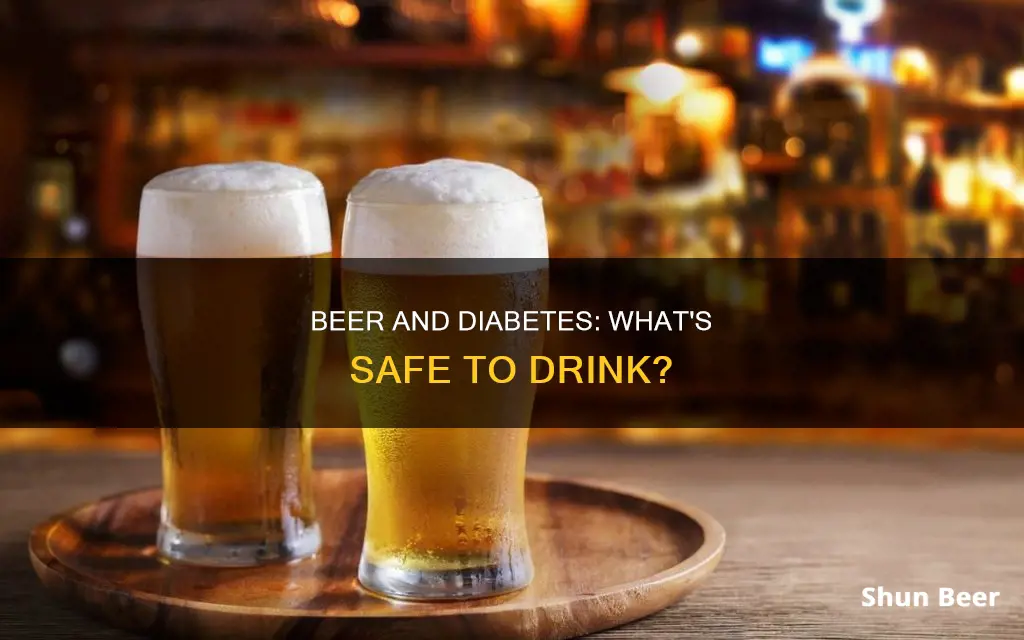
People with diabetes do not need to abstain from alcohol entirely, but they should be aware of how it can affect their body and how to manage this. Alcohol can cause blood sugar levels to rise or fall, and it can also affect diabetes medication. Beer and sweetened mixed drinks are high in carbohydrates, which can raise blood sugar levels. Alcohol also contains a lot of calories, which can lead to weight gain and make managing diabetes more difficult. It is recommended that people with diabetes follow the same guidelines as the general population: no more than one drink per day for women and up to two drinks per day for men. It is also important to eat before drinking and to avoid drinking on an empty stomach, especially if taking insulin or diabetes medication.
| Characteristics | Values |
|---|---|
| Can diabetics drink beer? | Yes, but in moderation. |
| How much is too much? | No more than 1 drink a day for women and up to 2 drinks a day for men. |
| How does beer impact blood sugar levels? | Beer is a significant source of carbohydrates, so it can impact blood sugar. |
| What are the risks of drinking beer with diabetes? | Drinking beer can lead to hypoglycemia (low blood sugar) as alcohol interferes with the liver's ability to release glucose into the bloodstream. |
| What are the symptoms of low blood sugar? | Feeling dizzy or lightheaded, loss of consciousness in more extreme cases. |
| How to prevent hypoglycemia when drinking beer? | Drink in moderation, don't drink on an empty stomach, monitor blood sugar levels, and stay hydrated. |
| Are there any other risks associated with drinking beer when diabetic? | Beer is high in calories and carbohydrates, which can lead to weight gain and affect blood sugar control. |
What You'll Learn

Beer impacts blood sugar levels
Beer can have both positive and negative impacts on blood sugar levels, depending on how much and how often you drink. Beer is a significant source of carbohydrates, which can cause an increase in blood glucose levels. The effects of beer on blood sugar levels can be seen up to 12 hours after you've consumed your last drink.
Positive Impacts
Moderate alcohol consumption (no more than one to two drinks per day) may be beneficial for people with diabetes. Some studies suggest that light drinking may even reduce the risk of developing type 2 diabetes. However, it's important to note that excessive alcohol consumption can lead to an increased risk of type 2 diabetes.
Negative Impacts
Beer can negatively impact blood sugar levels in several ways:
- Increased blood glucose levels: Beer contains carbohydrates, which are quickly absorbed into the bloodstream, leading to elevated blood sugar levels.
- Reduced blood glucose levels: Drinking excessive amounts of beer can lead to hypoglycemia, especially for those with type 1 diabetes or type 2 diabetes using insulin. The risk of hypoglycemia increases with the amount of alcohol consumed and can last up to 24 hours after drinking.
- Appetite stimulation: Alcohol stimulates appetite, which may lead to overeating and further increases in blood glucose levels.
- Interference with blood sugar regulation: Alcohol consumption can affect the hormones that regulate blood sugar levels, disrupting glucose production in the liver and contributing to low blood sugar.
- Interference with diabetes medications: Alcohol may interfere with hypoglycemic medications, reducing their effectiveness.
- Weight gain: Beer can be high in calories, and alcohol can stimulate appetite, leading to weight gain over time.
- Increased health risks: Excessive alcohol consumption is associated with raised blood pressure, neuropathy (nerve damage), dehydration, sleep disturbances, certain cancers, and heart disease.
Tips for Drinking Beer with Diabetes
- Drink in moderation: Stick to the recommended daily limits of one drink per day for women and two drinks per day for men.
- Avoid drinking on an empty stomach: Drinking on an empty stomach can impair the liver's ability to release glucose into the blood, causing blood sugar levels to drop.
- Drink with food: Drinking beer with a meal or a carbohydrate-rich snack can help maintain normal blood sugar levels.
- Monitor blood sugar levels: Check your blood sugar levels regularly, especially before and after drinking, to ensure they remain stable.
- Choose low-carb options: Opt for light beers or low-carb beer options, which have fewer carbohydrates and calories.
- Stay hydrated: Drink plenty of water along with your beer to maintain hydration and reduce the risk of a hangover.
Beer Drinking at San Angelo Rodeo: What's Allowed?
You may want to see also

Alcohol can cause hypoglycaemia
Drinking alcohol can be particularly dangerous for people with diabetes, as they are already at risk of low blood sugar. Alcohol can also cloud your judgement, so you may not realise that your blood sugar is low. This is especially true if you are drinking on an empty stomach, as this makes it extremely difficult for the liver to release glucose into the bloodstream. It is also more likely to lead to hypoglycaemia if you are taking insulin or other anti-hyperglycaemic medications.
Symptoms of hypoglycaemia can include dizziness, loss of consciousness, seizures, or coma in severe cases. It can be difficult to distinguish these symptoms from those of intoxication.
If you are drinking alcohol, it is important to be aware of the risk of hypoglycaemia, especially if you have diabetes or are taking insulin or other medications. Eating before drinking and drinking in moderation can help to reduce the risk of hypoglycaemia. It is also important to monitor your blood sugar levels and be prepared to treat low blood sugar if it occurs.
Beer and Flu Medication: A Safe Mix?
You may want to see also

Beer is high in calories
Beer contains as many calories gram for gram as a soft drink, so it can add a lot of calories to your diet. Studies have also shown that drinking alcohol can increase your appetite in the short term, causing you to eat more than you otherwise would. Furthermore, people don't always compensate for the calories they consume from alcohol by eating less of other foods. This means that drinking beer regularly could contribute a significant number of calories to your diet.
Beer may also prevent your body from burning fat. This is because your body prioritises the breakdown of alcohol over other sources of fuel, including stored fat. In theory, regular drinking could therefore contribute to an increase in body fat.
The calorie count in beer is dependent upon alcohol levels and sugar/carbohydrate content, with alcohol having the most impact due to the higher number of calories per gram. Beer also has the impact of delaying the fat-burning process. By viewing alcohol as a toxin, the body focuses its efforts on processing and eliminating it. As a result, everything else comes to a complete standstill, including the burning of stored fats.
The number of calories in a pint varies considerably between different types of beer. However, the prevailing opinion is generally that the darker the beer and the denser the head, the more carbs and calories it contains.
Vaccination and Beer: What's Safe to Drink?
You may want to see also

Beer is high in carbohydrates
Beer is typically higher in carbohydrates than other alcoholic drinks like wine or spirits. Beer is made from starch, which is a carbohydrate, and a 12-ounce can of beer has, on average, 13 grams of carbohydrates. However, the carb content of beers can vary widely depending on the type of beer.
"Light" beers tend to have the least amount of carbohydrates, usually 5 grams or less per serving. They also tend to be lower in alcohol content. For example, a light lager has 5.9 grams of carbohydrates per 12-fluid-ounce bottle. On the other hand, hoppy craft beers like IPAs and stouts tend to be much higher in carbs, typically containing 15 grams or more per serving. Stouts, Porters, and Guinness fall on the higher end of the carbohydrate spectrum among beers and can have upwards of 20 grams of carbohydrates per pint.
If you are watching your carbohydrate intake, it is important to be mindful of the carb content of the beer you are consuming. Beer cans and bottles do not always have nutrition facts labels, so it can be challenging to know the exact carb content. Additionally, different drinks come in different serving sizes, which can further complicate the comparison. However, you can find nutrition information for some major beer brands on websites like CalorieKing.com.
Drinking Beer and Boating: What's the Legal Limit?
You may want to see also

Alcohol affects weight loss
Alcohol can affect weight loss in several ways. Firstly, alcoholic drinks are often referred to as ""empty" calories, meaning they provide your body with calories but very few nutrients. For example, a 12-ounce can of beer contains approximately 155 calories, which is similar to the recommended calorie intake for an afternoon snack. Drinks with mixers such as fruit juice or soda contain even more calories. Secondly, when alcohol is consumed, the body prioritizes burning it as a fuel source before using glucose or lipids, which can result in excess glucose and lipids being stored as fat. Thirdly, alcohol can affect the liver's ability to metabolize and store carbohydrates and fats efficiently, leading to potential weight gain. Fourthly, alcohol can increase hunger and cravings for salty and greasy foods, leading to higher calorie intake. Fifthly, alcohol can impair judgement and lower inhibitions, making it harder to resist unhealthy food choices. Sixthly, alcohol can negatively impact sleep quality, leading to an imbalance in hormones related to hunger and energy storage. Finally, alcohol can affect digestion and nutrient absorption, impairing the metabolism of organs involved in weight management. While moderate alcohol consumption may not completely derail weight loss efforts, reducing alcohol intake can support a healthier body composition and improve overall health.
Beer After Best Before Date: Is It Safe?
You may want to see also
Frequently asked questions
Yes, you can still drink beer if you have diabetes, but it's not without risks. Beer is a significant source of carbohydrates, so it can impact blood sugar. It can also be high in calories, which may lead to weight gain. It's important to be mindful of how much you drink and to monitor your blood sugar levels.
When you have diabetes, your body struggles to get sugar into your bloodstream, which can lead to hyperglycemia (high blood sugar). Drinking alcohol interferes with your blood sugar levels and can cause hypoglycemia (low blood sugar) because the liver prioritises clearing alcohol from the body over releasing glucose.
Drinking beer with diabetes can cause low or high blood sugar, affect diabetes medications, and lead to other potential problems. Alcoholic drinks like beer are high in carbohydrates, which can raise blood sugar levels. They also contain a lot of calories, which can lead to weight gain and make it harder to manage diabetes.







